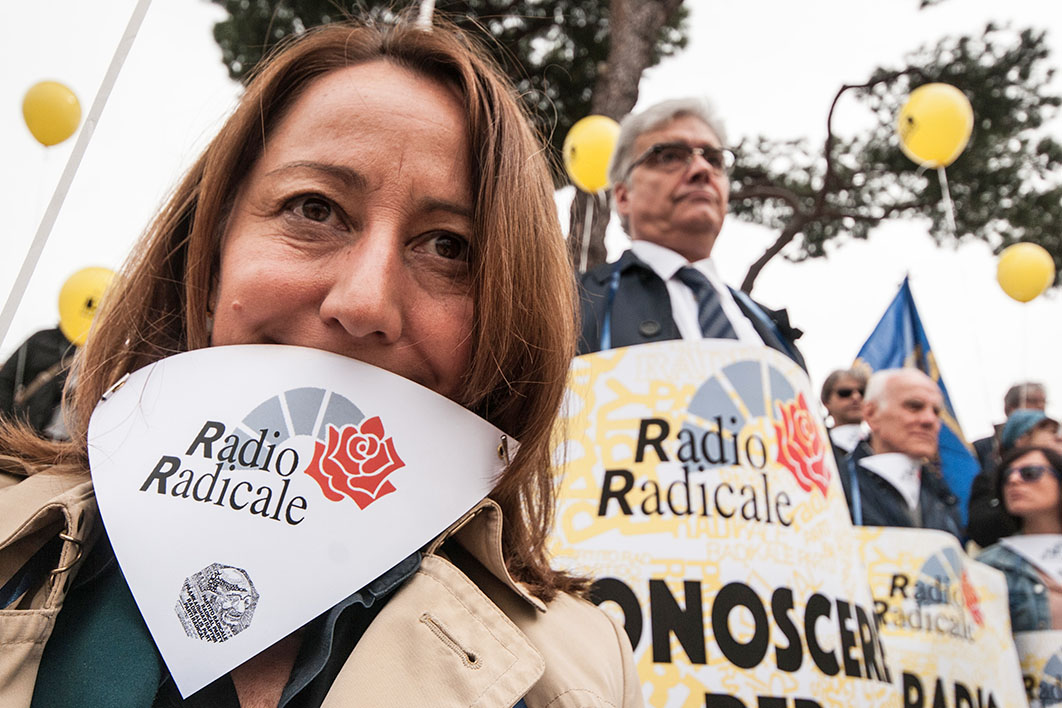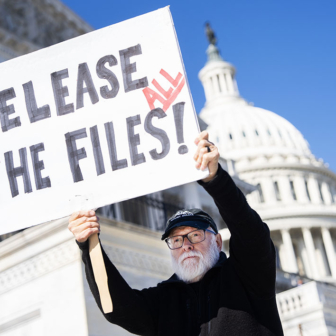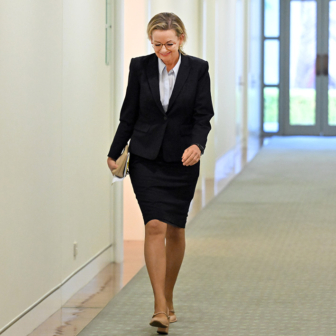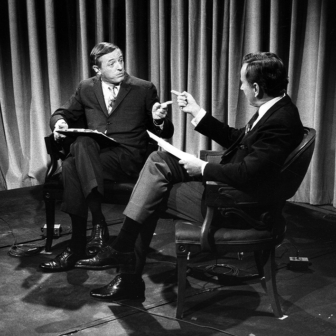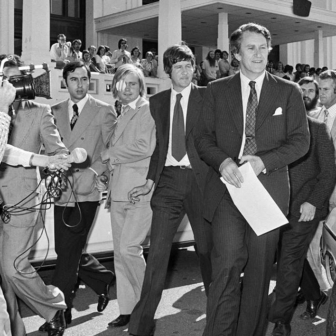If Italy were a normal democracy, there would be no need for Radio Radicale — at least, that’s the argument made by the Rome-based station’s supporters in recent months. What would be the point of broadcasting the workings of obscure parliamentary committees, unedited recordings of speeches delivered at conferences of minor political parties, or court deliberations at key trials if the institutions of state were healthy? Why would you bother with a militant campaign of transparency if established media outlets were already providing the electorate with everything it needed to make informed decisions at the ballot box?
The pleas to save Radio Radicale from looming funding cuts are predicated on the fact that Italy’s Radical Party and its feisty, libertarian broadcaster have never bought into the myth of Italy’s democratic normality. Rightly or wrongly, the small team of presenters who have accumulated an online archive of half a million audio recordings will tell anyone who’ll listen that unfiltered information is the only peaceful form of resistance to the state of illegality that Italians find themselves in. Only this kind of news, they say, is free of political manipulation or the spin of vested interests. Guerilla transparency is democracy’s only hope.
As for the mainstream media — the balkanised state broadcaster RAI or the rarely independent newspaper mastheads — Radio Radicale considers them mere texts to be studied in order to divine what the political establishment is up to in the backrooms of power. The late Sicilian novelist Leonardo Sciascia, himself a Radical Party MP in the early 1980s, once described Italian newspapers as “a stage curtain or, more precisely, an [amphitheatre] velarium, because they allow you to see something of what lies behind; they let you make out the objects that are there, the scene that’s being prepared.” To make sense of it requires “an eye that’s familiar with this, that’s well trained.” And when it comes to reading the signs, Radio Radicale’s presenters are master semioticians.
Yet the national radio station’s forty-four-year adventure is likely to come to an end this month. The current populist government — in particular, the Five Star Movement — has made no secret of its contempt for the broadcaster and the political leanings of the party that runs it. The executive has told Radio Radicale that the contract that provided state funds in return for live broadcasts of parliamentary sittings won’t be renewed when it expires next month.
In a society where the key political division is no longer between left and right but between the untranslatable garantisti and the giustizialisti, the Radicals and the current government were always destined to clash. In modern Italy, garantismo is a belief in the rule of law and the presumption of innocence; giustizialismo is the populist belief that not enough criminals are being locked up and that the work of public prosecutors is being stymied by corrupt political forces. And when it comes to justice, the Radicals have always been the most articulate garantisti around, condemning what they see as the politicisation of the magistracy and the Italian state’s track record of legal maladministration. Their argument, often lost on foreign observers, is that Italy’s real tragedy isn’t the number of guilty people at large but the number of innocent people behind bars.
This take on Italian society has always been a tough row to hoe and it can sometimes make for less-than-exciting programming. Likewise for Radio Radicale’s commitment to broadcast every speech from political-party conferences — even when the parties have nothing in common with the secular, liberal, libertarian, free-market-loving Radicals. Yet even the broadcaster’s many critics have conceded over recent weeks that the station’s obsessive, uncompromising commitment to transparency has provided Italy with a significant public service.
When it comes to public service, nothing spoke of the Radicals’ mission more than Radio Carcere (Prison Radio), the only Italian media outlet giving a voice to inmates whose human rights are routinely violated by overcrowding and underfunding. A program highlighting the fact that the Italian state has ignored its legal responsibility to provide them with acceptable living conditions was never going to appeal to a populist government that was elected on a tough-on-crime platform. Yet, to its credit, Radio Radicale never backed down and the program has become a rallying point for inmates and their families as they fight for justice — or, as the Radicals would put it, as they fight for legality.
As part of their campaign, the radicali would point to Italy’s infamous Article 41-bis law, which regulates the harsh regime usually reserved for those found guilty of mafia involvement, terrorism or other serious crimes. Every international human rights organisation that’s looked into the legislation, from the European Convention on Human Rights to Amnesty International and the Council of Europe, has expressed serious concerns about the regime, arguing that it crosses the line between punishment and torture.
For Radio Radicale, Italy’s inhumane treatment of its prison population and constitutionally dubious laws like 41-bis point to a deeper lack of respect for the rights of the individual — a notion dear to Europe’s classical liberals. The punishment meted out to prisoners is part of the same vicious circle of illegality in which serious crime is permitted to flourish, it says.
My jam on Radio Radicale for the past decade — my go-to podcast — has been Stampa e Regime (“Press and the Regime”). For years, the program’s presenter on weekdays, Massimo Bordin, spent more than an hour going through the country’s newspapers, trying to identify the common thread of the reporting and reminding readers of the ownership arrangements of the newspapers carrying the story. Foreigners are often surprised to discover that the country’s largest financial newspaper, Il Sole 24 Ore, is owned by Italy’s chamber of commerce, on whose members the paper is reporting. But at least that editorial conflict of interest is out in the open; with other publications the vested interests promoting the journalism remain opaque and the dissection of these power dynamics is where Stampa e Regime excelled.
Bordin’s voice wasn’t everyone’s cup of tea. In spite of his northeastern Italian surname, he spoke with a strong Roman accent, coughing and spluttering constantly (the studios appeared to have no mute button, in keeping with Radio Radicale’s mission of transparency). In true Radical style — a cloud of smoke invariably hung over the room during the party’s web-streamed executive meetings — Bordin was reported to have smoked three packets a day. In keeping with the Italian journalistic tradition of not repeating the same name in one sentence, he would refer to Corriere della Sera as “the masthead from Via Solferino” — the Corriere’s Milan address; the left-leaning Repubblica would be called “the newspaper founded by Eugenio Scalfari”; Turin’s La Stampa was “the daily published by Fiat Chrysler Automobiles.”
In a country where public figures, particularly journalists, steer clear of humour lest they be seen as lowbrow, Bordin was witty, engaging and often laugh-out-loud funny. He frequently referred to the fact that he had no formal academic qualifications, yet he brought to the job an encyclopedic knowledge of postwar Italian history, with all of its intrigue and political compromises. Where Italian public intellectuals would use their cultural superiority to obfuscate and confuse, Bordin’s knowledge was deployed to bring clarity to the political machinations he was describing. No matter where I was in the world, whether doing laps around Melbourne’s Princes Park or walking the streets of my father’s home town in Tuscany, Bordin’s voice would be in my earphones — coughing, spluttering and leading me through the dark forest of Italian politics.
Right until the end, Bordin never bought in to the popular narrative that there was something inherently Italian about bad governance, that the country’s history meant that its institutions would never be able to pull themselves out of the state of illegality in which they had come to operate. The Radicals’ simple — arguably simplistic — take was that there was a solution at hand, one based on personal integrity, political engagement and a meticulous respect for the law. Everything else, to use Bordin’s favourite French word, was an escamotage — a ploy, a ruse, an act of subterfuge.
When Bordin died this April, aged sixty-seven, it somehow felt like a bookend. The Radio Radicale experiment that began in 1975 had lasted longer than anyone could have expected. I bade him farewell and decided to box up what had become an important daily ritual. I allowed new Stampa e Regime podcasts to build up on my phone — unlistened to and unloved.
Radio Radicale’s nemesis, the giustizialista newspaper Il Fatto Quotidiano, didn’t cut the broadcaster any slack just because it had lost one of its most beloved presenters. In a scathing comment piece titled “Free-Marketeers with Other People’s Money,” the newspaper’s high-profile editor, Marco Travaglio, hit the radio station’s supporters where it hurt. “What a pain, how boring,” he wrote. “The Radicals, milking the death of our dearest enemy, Massimo Bordin, have started crying again.”
“They’re always whingeing about ‘the regime,’ of which they have been signed-up members for the past fifty years,” said Travaglio, warming to his theme. “And what’s bizarre for self-described liberisti [liberalists] and libertarians, they are demanding [money] from the illiberal… state that they have been attacking since the beginning of time.”
In fact, Radio Radicale had been asking for years that its contract with the Italian government be put up for tender, allowing it to compete on the open market that the Radicals believe in so passionately. (Over the years it had also campaigned for the privatisation of the country’s bloated, faction-ridden public broadcaster, RAI.) But the atmospherics of liberal-libertarians having to rely on a government contract to survive were always going to be problematic.
The harsh reality for Italy’s liberals, including the small Radical Party (and its many offshoots, including the most recent Più Europa), is that they’re loved by no one. Their socially progressive campaigns have alienated them from the country’s conservatives; their belief in free markets and support for Israel have pitted them against many on the left; their militant secularism has led them to clash repeatedly with the Catholic Church, an institution that Radio Radicale has covered meticulously and without reverence.
And as for the populists, even without their garantismo the Radicals’ pro-EU stance would have been enough to alienate them from the new ruling classes. When elected to the European Parliament, the Radicals were the only Italian members to sit with the Alliance of Liberals and Democrats, alongside politicians from countries with a much stronger tradition of classical liberalism, such as the Netherlands, Belgium and the Baltic states. In Italy, the Radicals are on their own.
This isolation means that, whatever the broader democratic significance of Radio Radicale’s campaign of transparency, public funding was always going to be problematic and private money — whether through sponsorship or advertising — would have made the station more like most Italian outlets, with its editorial stance compromised by those with the money to call the piper’s tune. The only other option would be to embrace grants and listener contributions, similar to the National Public Radio model of the United States — but this isn’t an option the radicali appear ready to embrace, despite years of grassroots campaigns going back to the 1974 referendum for the legalisation of divorce. There has never been a way for listeners, like me, to donate directly to Radio Radicale rather than the Radical Party.
As things stand, the station is in for the high jump, and an online archive of over forty years of a fanatical commitment to transparency seems consigned to history. That’s not to say the Radicals won’t regroup and find some way to make sure that the truth will out. But whatever happens, they’ll be doing it without Massimo Bordin, whose daily fight to catch a glimpse of what lies behind the stage curtain shouldn’t be forgotten. •
